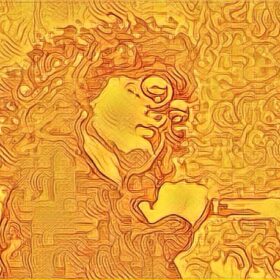See Page XX
Gunslingers & Gadgeteers: The Classes of Owl Hoot Trail
By Clinton R. Nixon
The rules of Owl Hoot Trail are based in old-school fantasy gaming, and so it was a given that the game would have classes. Defining classes in a role-playing game is a powerful influence over how the game is played. You are defining a vocabulary of character types and actions.
In many games, classes give niche protection to characters. Often, they do this through a progression of bonuses or statistics, varied by class, like d20’s Base Attack Bonus and Saving Throws. In Owl Hoot Trail, all characters have a base set of statistics by level. The way classes work in OHT are through special abilities and bonuses added on top of these standard statistics.
Let’s examine the first class, the Lawman, in detail. Lawmen are icons of Western movies and literature, and no game about the Wild West would be complete without them. This class is a perfect example of my approach to RPG design: be specific with core behavior, but open-ended with non-core rules so that the GM and players can bend the rules to their own play style.
Lawmen get a tin star and a license to keep order. They have a +1 bonus to Toughness and +2 to Amity. They don’t get sick and get a +1 bonus to all defenses. This increases by +1 at 3rd level and every 3 levels on. Lawmen can detect if a soul’s up to no good within eyesight at will and can heal a body up to 2 hit points per level per day by sharing a drink.
A Lawman can use any weapon.
A character must be law-abiding to be a Lawman.
In this example, you can see that Lawmen get a recurring bonus to their defenses and some bonuses to two skills, Amity and Toughness. Their healing ability is also specific about its effects. The Lawman is more open-ended, though, in how it interacts with the environment of the game. First, they “have a license to keep order.” The jurisdiction of that and full range of abilities is left up to the GM. Lawmen also “don’t get sick.” Obviously, they won’t be affected by disease, but what about food poisoning or snakebite? What about magical diseases? As a GM, I would rule them unaffected by all these, but I wouldn’t rule out the option that they could be afflicted by some disease-like curse in the future.
Lastly, we see that Lawmen can “detect if a soul’s up to no good” and that they “must be law-abiding.” There’s no alignment in OHT, so these are rules wthout strict limitations or quantifiable results, but they definitely have real effects in play.
If you’ve ever played a fantasy role-playing game, you probably recognize some of the abilities of a Lawman to be the same as a paladin. Likewise, there are rough equivalents to many fantasy classes in OHT. The Scout is much like a ranger; the Scoundrel plays the role of a rogue; both Gunslingers and Ruffians have some of the qualities of a fighter.
The magic-using classes in traditional fantasy RPGs have counterparts in OHT, but their abilities have been split into multiple classes and given new flavor. The Gadgeteer is inspired by steampunk and the Wild Wild West movie (not a shining example of cinema, but a rich gold mine for schlock and fun abilities.) Gadgeteers have the flashy effects of a wizard, but use contraptions they’ve made themselves to make these effects happen. The management of these abilities uses a unique twist on D&D-esque Vancian magic in order to make these gadgets matter. Mentalists are inspired by traveling hypnotists and magicians of the sort you’d see in a Wild West carnival. Drawing on their inner strength, they can effect the minds of those around them, causing their audience to see the fantastic and believe untruths.
Preachers are not that different from their clerical brethren in fantasy RPGs, although they draw on their own energies like Mentalists. This does not imply that their abilities are illusory tricks, but instead the personal nature of faith in a more modern world as opposed to the cultural nature of religion in a fantasy world. Shamans operate mechanically like Gadgeteers, in that they have to tend to spirits they collect and call on those spirits to perform nature-based effects.
Like I mentioned at the beginning, classes are a vocabulary for your game. In Owl Hoot Trail, that vocabulary consists of Lawmen, Scouts, Gunslingers, Ruffians, Scoundrels, Gadgeteers, Mentalists, Preachers, and Shamans. Together, these make up a gang of heroes that look familiar to modern Wild West images but have iconic resonance with old-school fantasy gaming.


